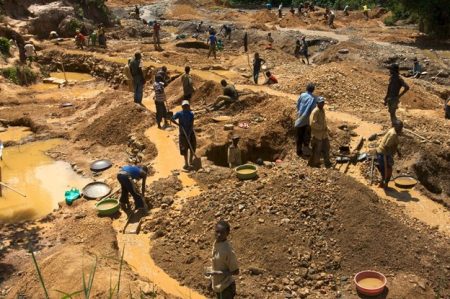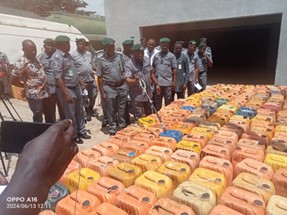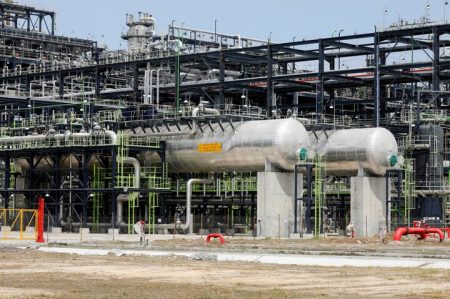 16 October 2016, Sweetcrude, Lagos — It is no longer news that Nigeria is broke and experiencing a recession. The news is that the government of Nigeria seeks to divest its assets in some strategically held holdings, such as the Nigerian Liquefied Natural Gas, NLNG, company with a view to applying the proceeds of the divestment into an economic resuscitation effort.
16 October 2016, Sweetcrude, Lagos — It is no longer news that Nigeria is broke and experiencing a recession. The news is that the government of Nigeria seeks to divest its assets in some strategically held holdings, such as the Nigerian Liquefied Natural Gas, NLNG, company with a view to applying the proceeds of the divestment into an economic resuscitation effort.
As a capitalist and a hardcore federalist, one has never seen the justification behind the Nigerian government forcibly vesting upon itself the ownership and control of natural resources, such as crude oil and gas. The reality, however, is that by Nigerian Law, oil and gas deposits in Nigerian territory belong to the Federal Government of Nigeria.
However, limited by the paucity of funds, Nigeria’s alter ego, the NNPC went into a Joint Venture partnership with Shell Gas, Total and ENI, retaining 49% of the partnership; Shell Gas, Total and ENI have 25.6%, 15% and 10.4% respectively as stakes for their investments in the project. The implication of this is that if there is to be a sale of Nigeria’s assets in the NLNG company, the NNPC or the Federal Government has only its 49% to divest and not the whole NLNG company.
The questions Nigerians are asking the government about the proposed divestment of the country’s 49% stake in the NLNG are very salient ones and should be addressed by the government in a public forum dedicated to the unveiling of the strategies for the planned divestment.
Nigerians want to know how the government can take advantage of the funds realised from the exercise within the context of the Treasury Single Account and the law that provides that all monies paid into the Federation Account shall be shared. In what ways can the country leverage on the proceeds of the divestments if they are dispersed to the 36 states and 774 local government authorities? How does the Federal Government plan to circumnavigate the law that mandates it to share monies accruing to the federation account?
The people of Nigeria are by law the beneficiaries of the Trust the federal government administers in the NLNG and has a right to know how the divestment in the NLNG stake would aid Nigeria’s efforts to come out of its economic doldrums. And who is positioned to acquire Nigeria’s stake in the NLNG? When the story of the planned divestment broke, the reports suggested that Qatar, a leading player in the gas industry, had approached the federal government with the proposal to come into its assets in the NLNG.
Qatar is an Islamic state in the Persian Gulf that is involved in a lot of Islamic charities all over the world. It will be an act of provocation to hand over assets and consequently access into Christian Nigeria that have the potential of influencing or controlling the economic fortunes of a region and its people.
The people of the South-South region of Nigeria are wary of religious indoctrination by their Northern compatriots; the development of the political relations of both regions have been marked by suspicion of the religious objectives of the Muslim North for the predominantly Christian South-South, where the assets under discourse are located.
It is true that the Nigerian Stock Exchange may not be able to soak up an offer of the magnitude of the proposed NLNG divestment but Nigeria can, with or without any laid down requirement in the Company’s Memorandum and Articles of Association or mandatory provisions in the Joint Venture Partnership documents, still extend to its current Joint Venture partners, a right of first refusal for the acquisition of the majority shares . The Shell group, Total and ENI have done energy business in the South South of Nigeria for so long that they have perfected the strategies for profitable production in the region.
Again while the federal government is considering the NLNG divestment, it should also consider putting up for sale its stakes in the Joint Venture Production partnerships for the exploitation of crude oil in Nigeria.
Nigeria holds 57% of the Joint Venture between NNPC and Shell Petroleum Development Company, 60% each of its partnerships with Mobil, Total and Chevron. Nigeria is obligated to paying cash for the financial needs of the operations of the Joint Ventures, obligations Nigeria has neglected to meet in about the past four years with dire consequences to its economy as it has had to meet those obligations through a dubious crude swap process that the country lacks the credentials to monitor or certify.
It is hoped that the federal government shall make necessary consultations and review its planned divestment of Nigeria’s stakes in the NLNG in order to put in place a set of strategies that would widen the scope to include assets that are not being administered optimally and present Nigeria with the best re-investment plan for the financial and social consequences of the divestment process.



